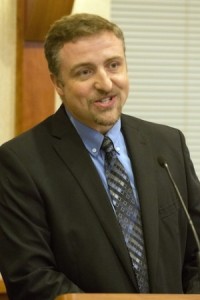By JAMES KATES / The Capstone
The public hearing on the 2018 Jefferson County budget may have been a humdrum affair, but several months of hard work went into the document that is likely to be approved without controversy next month.
No one showed up Tuesday to speak to the Jefferson County Board about the 2018 spending plan. That’s not surprising, given that state spending limits have put some pretty tight constraints on what county supervisors can do in this area.
“We don’t have a lot of wiggle room, and we don’t have a lot of dissension over our spending priorities,” County Board Chair Jim Schroeder told reporters before the meeting.
Overall, the budget calls for spending $72.3 million in 2018. The bulk of that money goes to the Sheriff’s Department (including the County Jail), the Human Services Department and the Highway Department.
The countywide tax levy will be $27.4 million. The tax rate is set at 4.1606 mills, meaning the owner of a home assessed at $100,000 would pay $416 in property taxes to the county.
Homeowners in parts of the county served by the county Health Department (as opposed to city health departments) and/or local library systems would pay some additional property taxes, bringing the total levy to $29.3 million.
The rest of the budget comes from state and federal money, fines, fees and a countywide sales tax of 0.5 percent.
The total value of taxable property – residential, commercial and industrial – in Jefferson County is about $6.6 billion, which is actually less than it was in 2009. Figures show that the financial crisis of 2007-’08 took a toll on real-estate values, which are only now returning to their former levels.
Because wages and other expenses have risen, the county has had to raise its tax rate, which was 3.5862 mills in 2009 before hitting a high of 4.3917 mills in 2015. The mill rate since has gone down slightly as property values have recovered.
County Supervisor Dick Jones, who is chair of the board’s Finance Committee, told reporters that the county tries to manage its finances conservatively. It has three months of working reserves on hand, plus contingency funds for expenses such as employee retirement payouts.
State laws permit the county to raise taxes based only on new construction, which amounted to a tax increase of about $290,000 for 2018, Jones said.
“Our spending is essentially flat,” Schroeder told reporters. “Fortunately in my time here we have not had to cut services.”
County officials who are finalizing a new strategic plan have concluded that the only way for the county to continue providing a full range of services is through economic growth, which will generate new tax revenue, he said.
“The county has been seen as anti-development” because of its emphasis on preservation of farmland and natural spaces, he said. More “balance” is needed between agriculture and industry to sustain growth, he added.
To that end, a new nonprofit organization – the Glacial Heritage Development Partnership – has set out to raise several million dollars to promote development in the county, Schroeder said.
In other budget outlays, about $1.1 million is allocated to debt service in 2018. That money will be used to pay down construction bonds that were issued to build the county’s highway shop on Highway W on the outskirts of Jefferson.
The county clerk’s office will spend more in 2018 – nearly $505,000, up from $333,000 in 2017. The money will go toward buying new voting machines and other expenses associated with the November 2018 gubernatorial and congressional elections.
One area of strain on the budget has been the opioid addiction crisis, which has put pressure on courts, child support enforcement, law enforcement and human services, Jones said.
Schroeder noted that county supervisors voted in September to join a lawsuit against pharmaceutical companies being brought by the Wisconsin Counties Association. The lawsuit seeks compensation to help counties prevent and treat addiction.
Marc Devries, the county’s new finance director, told supervisors Tuesday that they still could submit amendments to the budget. Any amendments will be weighed by the Finance Committee before being forwarded to the full County Board.
The board is expected to give final approval to the 2018 budget at its meeting Nov. 14.




